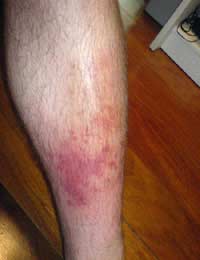What is Cellulitis?

Cellulitis is the medical term that is used to describe a serious infection within the tissues of the skin. It is not the same as cellulite, which is the development of lumpy, orange peel patches of skin around the thighs and buttocks. This is due to the build up of fat deposits, which are forced through the connective tissue mesh just beneath the skin, causing the characteristic lumpy appearance.
Cellulitis occurs when bacteria start to grow and infect this connective tissue, causing swelling, redness and intense pain. As the infection gets worse, the person with cellulitis starts to feel really unwell, with sweating, fever, tiredness and lethargy and often nausea and vomiting. The infection can spread within the connective tissue quite rapidly and cases of cellulitis that affect the skin on the face need urgent medical attention.
How Does Cellulitis Start?
All cases of cellulitis start with a break in the skin. This can happen in many ways – a cut, bump or scrape can break the skin. An insect bite, a tattoo, athlete’s foot, dry and chapped skin, having an injection (particularly if illegal drugs are injected with a dirty needle) can all also lead to cellulitis.Once the damage is done, bacteria from the environment, or commensal bacteria that normally live on the skin enter below the surface and start to multiply in the fluid and nutrient-rich environment. The area of skin around the originally injury becomes very red and red lines can extend away from the original injury site if the infection starts to track up the lymphatic vessels.
What Bacteria Cause Cellulitis?
The most common bacteria responsible for cellulitis are the Streptococci and the Staphylococci, which both exist on most people’s skin. They don’t have to be particularly virulent, or antibiotic resistant; just the penetration of the skin barrier is enough to give the bacteria the foothold to cause a deep seated skin infection. Other bacteria can also cause the infection – Haemophilus influenza, Helicobacter pylori, the bacteria that causes tuberculosis and several other species. All bacteria are potentially able to thrive in the moist environment just under the skin.Is Cellulitis Serious?
Everyone has spots and boils from time to time and most people assume cellulitis doesn’t need treatment and will resolve itself quickly but this is often not the case. The infection can spread rapidly, affecting large patches of skin and causing bacteria to penetrate lymphatic vessels, and then the blood, causing generalised septicaemia and septic shock, which can be rapidly fatal.Cellulitis in the skin of the face can spread quickly to the meninges, causing bacterial meningitis. It should therefore be taken very seriously and anyone with a red patch of skin that doesn’t heal and gets worse over a period of days, becoming very red and inflamed should see their doctor as soon as possible.







